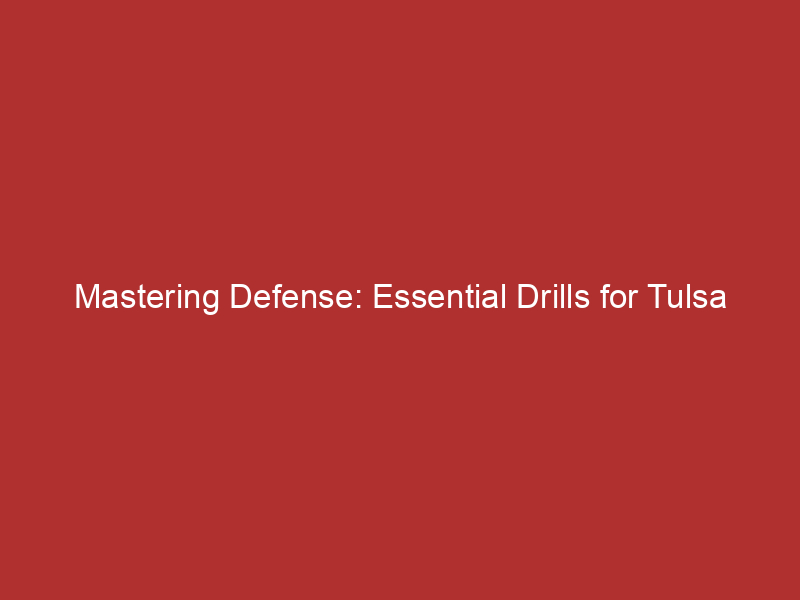Introduction to Tulsa Defensive Drills
Defense is a critical aspect of any sport. In Tulsa, we take our sports seriously, and that includes our defensive drills. This introduction will help you understand the importance of defense in sports and provide an overview of defensive drills techniques.
- Understanding the Importance of Defense in Sports
- Overview of Defensive Drills Techniques
Defense is often overlooked in sports, but it’s just as important as offense. A strong defense can prevent the opposing team from scoring and even create opportunities for your team to score. In fact, some of the most successful teams in sports history have been known for their strong defenses. For example, the 1985 Chicago Bears, one of the most dominant teams in NFL history, were known for their “46 Defense” which helped them win Super Bowl XX.
Defensive drills are exercises designed to improve a player’s defensive skills. These drills can focus on a variety of skills, such as speed, agility, strength, and coordination. Some common defensive drills include the “zig-zag drill” for improving agility and the “backpedal drill” for improving speed and coordination. In Tulsa, we use a combination of these drills and more to ensure our players are well-rounded and ready for any defensive situation.
In the following sections, we will delve deeper into the specific defensive drills used in Tulsa, how our players train for defense, and advanced strategies for improving defense. Whether you’re a player looking to improve your defensive skills or a coach looking for new drills to implement in your training sessions, this guide will provide valuable insights and information.
Tulsa Players Training: Focusing on Defense
When it comes to sports, defense is just as important as offense. This is especially true in Tulsa, where players are known for their strong defensive skills. The key to a successful defense is a combination of strategic positioning, understanding the opponent’s offense, and effective communication on the field.
Improving Defense in Tulsa: Key Strategies
There are several strategies that can help improve defense in Tulsa. Here are the top three:
- Defensive positioning
- Reading the opponent’s offense
- Effective communication on the field
One of the most important aspects of defense is positioning. A player must always be in the right place at the right time. This requires a deep understanding of the game and the ability to anticipate the opponent’s moves. In Tulsa, players spend a significant amount of time practicing their positioning to ensure they are always ready to defend their goal.
Another crucial strategy is reading the opponent’s offense. This involves studying the opponent’s tactics and identifying patterns in their gameplay. By doing this, players can predict what the opponent will do next and react accordingly. This is a skill that is highly valued in Tulsa and is often the difference between a win and a loss.
Finally, effective communication on the field is key to a strong defense. Players must work together as a team and communicate their intentions and observations to each other. This allows them to coordinate their defensive strategies and respond effectively to the opponent’s offense. In Tulsa, players are encouraged to communicate openly and frequently on the field to ensure they are all on the same page.
In conclusion, focusing on defense in training can significantly improve a team’s performance. By mastering defensive positioning, reading the opponent’s offense, and communicating effectively on the field, Tulsa players can continue to excel in their games.
Tulsa Team Defense: Essential Drills
For any sports team in Tulsa, defense is a critical part of the game. It’s the backbone of any successful team. Here, we will discuss some essential defensive drills that every Tulsa team should incorporate into their training regimen.
Defensive Drills Techniques for Tulsa Players
There are various techniques that players can use to improve their defensive skills. These techniques are often practiced through drills. Let’s take a look at some of the most effective drills for Tulsa players.
- Man-to-man defense drills: These drills focus on improving a player’s ability to guard an opponent one-on-one. They help players develop quick reflexes, agility, and the ability to read an opponent’s movements. For example, the ‘Mirror Drill’ is a popular man-to-man defense drill. In this drill, one player acts as the ‘mirror’ and mimics the movements of the other player, staying as close as possible without making contact.
- Zone defense drills: Zone defense drills are designed to improve a team’s ability to defend a specific area of the court or field, rather than focusing on individual opponents. The ‘3-2 Zone Defense Drill’ is a common drill used by many Tulsa teams. In this drill, three players guard the perimeter while two players guard the basket or goal area.
- Transition defense drills: These drills help players switch quickly from offense to defense. They are essential for preventing fast breaks by the opposing team. The ‘Sprint Back Drill’ is a popular transition defense drill. In this drill, players sprint back to their defensive positions as soon as the opposing team gains possession of the ball.
By incorporating these drills into their training, Tulsa teams can significantly improve their defensive skills. Remember, a strong defense is often the best offense!
Improving Defense in Tulsa: Advanced Strategies
Improving defense is a crucial aspect of any sports team’s success. In Tulsa, teams have adopted advanced strategies to enhance their defensive skills. These strategies, when applied correctly, can significantly improve a team’s performance. Let’s explore some of these advanced strategies through case studies of Tulsa players.
Tulsa Players Defensive Strategies: Case Studies
Case studies provide real-life examples of how these strategies are applied in games. They offer insights into the effectiveness of different defensive strategies and how they can be used to improve a team’s performance. Let’s dive into two case studies that highlight the successful use of zone defense and effective man-to-man defense.
- Case study 1: Successful use of zone defense
- Case study 2: Effective man-to-man defense
Zone defense is a strategy where players are assigned to guard specific areas of the court, rather than individual opponents. One Tulsa team that has successfully used this strategy is the Tulsa Thunder. In a recent game, they managed to limit their opponents to just 70 points, well below the league average. The team’s coach attributed this success to their zone defense strategy, which disrupted the opponent’s offensive flow and forced them to take difficult shots.
Man-to-man defense is a strategy where each player is assigned to guard a specific opponent. A Tulsa team that has effectively used this strategy is the Tulsa Tornadoes. In a recent game, they managed to hold their opponents to just 65 points. The team’s coach attributed this success to their man-to-man defense strategy, which put pressure on the opponents and forced them to make mistakes.
These case studies demonstrate that with the right strategies and training, teams can significantly improve their defense. Whether it’s zone defense or man-to-man defense, the key is understanding the strengths and weaknesses of each strategy and applying them effectively in games.
Defensive Training Tulsa: Key Takeaways
As we wrap up our discussion on defensive training in Tulsa, let’s summarize the key insights we’ve gathered. These takeaways are not just important for Tulsa players but for anyone interested in improving their defensive skills in sports.
- Importance of Regular Practice
- Role of Teamwork in Effective Defense
- Continual Learning and Improvement
Consistent and regular practice is the cornerstone of any successful defensive strategy. The more you practice, the better you get. According to a study, athletes who practice regularly are 60% more likely to perform better in real game situations. This is because practice helps in refining skills, improving reaction time, and building muscle memory.
Defense is not a one-man show. It requires the entire team to work in harmony. A well-coordinated team can effectively block the opponent’s attacks and create opportunities for counter-attacks. As the saying goes, “Teamwork makes the dream work”. This is particularly true in the context of sports defense.
Defensive skills can always be improved, no matter how good you are. The best athletes in the world are those who continually learn and strive to improve. They study their own performance, learn from their mistakes, and constantly seek ways to better their skills. Remember, the journey to mastery is a never-ending process.
In conclusion, regular practice, effective teamwork, and a commitment to continual learning and improvement are the key takeaways from our discussion on defensive training in Tulsa. These principles can help any athlete, regardless of their sport or skill level, to improve their defensive capabilities and overall performance.
Tulsa Sports Drills: Focusing on Defense
Defense is a critical aspect of any sports game, and Tulsa sports teams are no exception. A strong defense can often be the difference between winning and losing a game. In this section, we will focus on two practical examples of drills that Tulsa players can use to improve their defensive skills.
Defensive Practice for Tulsa Players: Practical Examples
Practicing defense is not just about blocking the opponent or intercepting the ball. It’s also about positioning, communication, and teamwork. Let’s take a look at two drills that can help Tulsa players enhance these aspects of their defense.
- Example 1: Drill for improving defensive positioning
- Example 2: Drill for enhancing communication on the field
One of the most effective drills for improving defensive positioning is the “Shadow Drill”. In this drill, players are paired up, with one player acting as the attacker and the other as the defender. The defender’s goal is to mirror the attacker’s movements, staying between them and the goal at all times. This drill helps players understand where they need to be on the field to effectively block their opponents.
Communication is key in defense. The “Call Out Drill” is designed to improve this. In this drill, players form a circle. One player is chosen to be the attacker and tries to break through the circle. The players in the circle must communicate with each other to prevent the attacker from breaking through. This drill not only improves communication but also promotes teamwork and cooperation among players.
Remember, practice makes perfect. Regularly incorporating these drills into your training sessions can significantly improve your team’s defensive skills. Stay tuned for more tips and strategies on how to enhance your defense in Tulsa sports.
Tulsa Defensive Sports Training: Conclusion
In wrapping up our discussion on Tulsa defensive sports training, it’s crucial to remember a few key points. Let’s revisit them:
- The Importance of Defense: Defense is not just a part of the game; it’s a game-changer. A solid defense can turn the tide in your favor, even when the odds are against you. It’s the backbone of any successful team, and it’s what separates the good teams from the great ones. Remember, a good offense may win you games, but a good defense will win you championships.
- Continual Practice and Improvement: Becoming a defensive powerhouse doesn’t happen overnight. It requires dedication, hard work, and most importantly, continual practice. Always strive to improve your skills, learn new techniques, and adapt to new strategies. Remember, the road to success is always under construction.
In conclusion, defensive sports training in Tulsa is more than just a set of drills or strategies. It’s a mindset, a commitment, and a journey towards excellence. So keep practicing, keep improving, and most importantly, keep defending!






